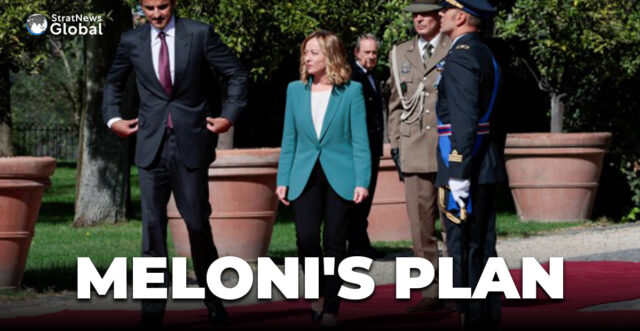
Italy’s government on Monday passed a decree aimed at overcoming court objections to its flagship immigration plan that is aimed at deterring boat migrants by sending them to detention camps in Albania.
The plan, launched last week, was immediately undermined as a Rome court said the first batch of asylum seekers dropped off in Albania had to be brought to Italy because their countries of origin – Egypt and Bangladesh – could not be considered safe.
The government initiative proposes sending to Albania male migrants from so-called “safe countries”, which means they have little chance of winning asylum. If, as expected, their
request for residency in Italy were rejected, they would be repatriated.
However, the Rome court decision called into question the entire Italian project and sparked a fierce row between Prime Minister Giorgia Meloni’s rightist administration and the judiciary.
Migrants cannot be detained in a reception facility in Albania and have a right to be brought to Italy, a court in Rome ruled, dealing a blow to Prime Minister Giorgia Meloni’s plan to divert asylum-seekers abroad https://t.co/XSXSByGqyQ pic.twitter.com/panRiNLP9i
— Reuters (@Reuters) October 18, 2024
The Rome court acted on the basis of a recent ruling by the European Court of Justice (ECJ) in a case involving the Czech Republic, which said a country outside the EU cannot be declared safe unless its entire territory is deemed free of danger.
Looking to overcome this unexpected legal hurdle, the government upgraded the legal status of its list of safe countries, making it an act of law rather than a lesser ministerial decree, believing this means it will be harder for courts to challenge its validity.
It also removed three of the original 22 states on the list — Nigeria, Columbia and Cameroon — because of specific concerns about the safety situation in those nations.
“(Our move) stems from a very detailed ruling by the EU Court of Justice that was probably not well understood,” Justice Minister Carlo Nordio told reporters, taking a swipe at the Rome court for the way it had interpreted the EU ruling.
DOUBTS PERSIST
Interior Minister Matteo Piantedosi added that the new law “provides a standard” for judges to follow, rather than indulge in a “wavering interpretation” of the EU judgment.
Meloni had denounced the decision to transport the first group of migrants to Italy, calling it prejudiced, while Nordio said at the time it was “abnormal” for judges to establish which countries could be deemed as safe.
The magistrates’ union said the court had merely complied with the requirements of EU law.
However, it is unclear whether the new decree will prevent judges in future from rejecting requests to detain migrants in Albania, experts say.
“The conflict with the European law, which is superior to the national legislation, remains … unless Italy wants to say European sources are not binding on this matter,” said Salvatore Curreri, a constitutional law professor at Enna Kore University.
Italy’s Albania plan, which evoked comparisons with Britain’s aborted scheme to send asylum seekers to Rwanda, was highlighted as a possible model for other EU nations by European Commission President Ursula von der Leyen.
The scheme was inaugurated last Wednesday when 16 migrants were brought ashore to Albania. Four were taken to Italy within hours because they were underage or because they were unwell, while the remaining 12 followed them soon afterwards thanks to
the intervention of the Rome court.
In a career spanning three decades and counting, Ramananda (Ram to his friends) has been the foreign editor of The Telegraph, Outlook Magazine and the New Indian Express. He helped set up rediff.com’s editorial operations in San Jose and New York, helmed sify.com, and was the founder editor of India.com.
His work has featured in national and international publications like the Al Jazeera Centre for Studies, Global Times and Ashahi Shimbun. But his one constant over all these years, he says, has been the attempt to understand rising India’s place in the world.
He can rustle up a mean salad, his oil-less pepper chicken is to die for, and all it takes is some beer and rhythm and blues to rock his soul.
Talk to him about foreign and strategic affairs, media, South Asia, China, and of course India.




